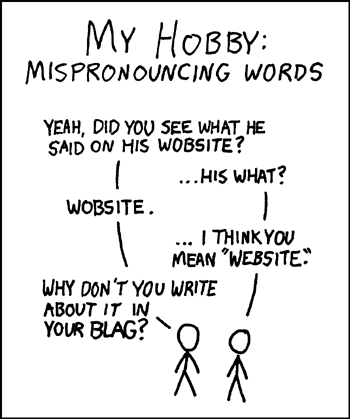I found a couple of mind mappers I hadn't seen before, and one that a friend had mentioned called The Brain. The video demos look good.
There's also an open-source web-based HTML editor called Amaya I hadn't seen before.
By the way, the neologism "blag" comes from "blog" as an intentional misselling, courtesy of xkcd:
 So...log comes from a ship throwing a piece of wood over the side to see how fast it's moving, which comes to mean the book the readings are written in, which comes to mean any form of recording information regularly. Meanwhile "world wide web" gets shorted post haste to "web," and the two words get put together to make "web log," which contracts to "blog" and now (if you're sufficiently geeky and want to be ironic) "blag." Isn't language fun?
So...log comes from a ship throwing a piece of wood over the side to see how fast it's moving, which comes to mean the book the readings are written in, which comes to mean any form of recording information regularly. Meanwhile "world wide web" gets shorted post haste to "web," and the two words get put together to make "web log," which contracts to "blog" and now (if you're sufficiently geeky and want to be ironic) "blag." Isn't language fun?







an webbed brain example (beeing using this software since 1998) Web 2.0 in Education - a work in progress for a conference panel session.
ReplyDeleteCool! I didn't know you could publish them as live objects. (Clicking on a node centers it and rearranges the others)
ReplyDelete